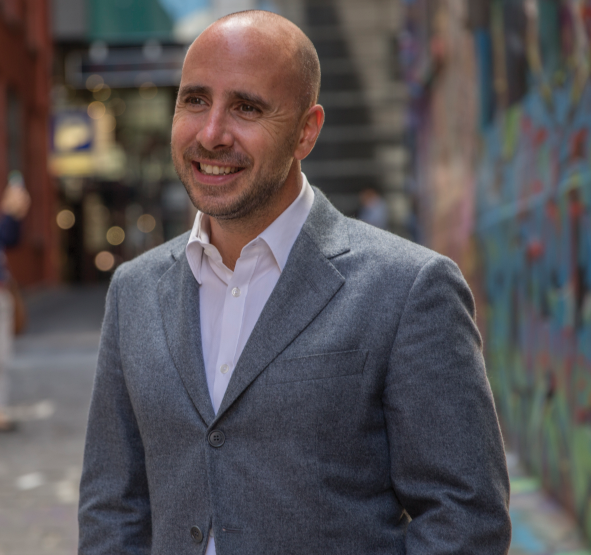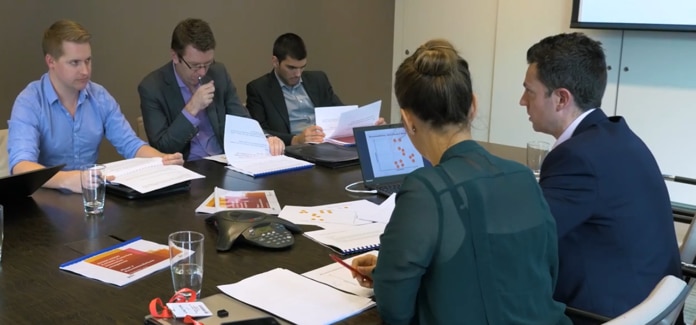“Put your hand up if you had to do an exam at work this week?”
Education entrepreneur and Ducere Global Business School founder Mat Jacobson asks this question at nearly every one of his speaking engagements around the world.

The answer – normally a mix between bemusement and giggling – is why Ducere has built a small suite of business degrees that puts the focus on graduating with a portfolio of successful real world projects, not a GPA.
“At the end of their studies we want our students to be able to present to their manager, or walk into a job interview, and push a portfolio of amazing global strategic projects across the table, not a meaningless transcript,” Jacobson told MBA News.
“A transcript will largely indicate your ability to learn and regurgitate theory; a portfolio of work with some of the most respected organisations in the country demonstrates your ability to learn and apply knowledge to achieve an outcome.
The Torrens University-accredited MBA (Innovation and Leadership) program that is delivered by Ducere, has become one of Australia’s most unique courses, not only for its flexible delivery structure but because of its project-based curriculum.
The MBA is structured around three major projects with Ducere’s industry partners, some of which include NAB, KPMG, Telstra, Save the Children and the Federal Treasury. Throughout the program, students will work on real projects with real commercial impact, while gaining exposure to the most successful and consequential organisations in the country.
Disrupting traditional learning
As a social enterprise, Ducere’s primary goal is delivering pioneering education initiatives in Australia, the UK and Africa. Higher education programs delivered by the Ducere Global Business School, including its MBA, fund the ground-breaking publishing, school development and mentorship work of the Ducere Foundation, providing unique learning and leadership opportunities in 21 African nations.
In building Ducere’s programs, Jacobson has deliberately sought to take the very best of traditional, academe and turbo-charge it with a unique online delivery model and the most industry-relevant course curriculum and content.
Above all, Jacobson says Ducere is focussed on breaking down the challenges and barriers presented by traditional university-based programs when it comes to the currency, relevancy and application of course material.
“In terms of the currency, most university content is about a decade old. To put that into perspective, smartphones were only invented 10 years ago. Facebook, which is the biggest advertising platform in the world, came online about the same time and the sharing economy and companies like AirBnB and Uber were still in their infancy,” he said.

“To think that students are learning in environments where they’re being taught materials that are predating a lot of these transformations seems out of touch.
“Relevancy of content is another area where we provide students with a much more sophisticated solution. While career academics are very good at research and developing theories, this work sometimes lacks industry relevance.”
The application of course learnings is the one area where Jacobson thinks many educators, universities in particular, struggle to provide consistent, valuable, transformative experiences.
“This brings us back to the question about the relevancy of exams. Of course no one puts up their hand because no one does exams as part of their daily work functions but for some reason, university is structured around essays and exams as the model for applying learnings.”
This is not just a problem in Australia, with other countries also seeking to develop models that prioritise application of knowledge over recital of knowledge.
In the UK, part of the response has been to introduce ‘degree apprenticeships’ that combine full-time paid work and part-time university study to offer candidates the opportunity to gain a full Bachelors or Masters degree while partaking in practical, on-the-job training.
In the US, the concept of immersive applied learning has led to the creation of formal Work Colleges. The colleges are federally designated institutions that have “comprehensive work-learning-service” programs as an essential and core component of their educational programs.
Unique to work colleges is the requirement that all resident students participate in a comprehensive-work-learning service program for all four years of enrolment. Therefore, all resident students have jobs. Most students work at on campus jobs, while some students hold off campus positions.
Jacobson has taken these concepts and applied them to Australia’s MBA environment to develop the most industry-relevant degree in the country.
“Our MBA students are working on real life projects from the day they start their MBA until the day they graduate. It’s not a capstone project or a one off, or an internship,” he said.
“The entire MBA from start to end is integrated with companies like Telstra, Seek, PricewaterhouseCoopers, Save the Children, Mission Australia and Federal government departments.”
“And when we say students are working on these organisations, they are working on real challenges and opportunities. They have to network and engage with the teams at those companies and then present real solutions to those challenges. It’s not a historical case study.”
With PWC, students were asked to look at how artificial intelligence could actually disrupt or innovate the professional services sector and what recommendations could be made as far as how PWC could look at adopting artificial intelligence into that marketplace.
Matching Theory and Practice
While project-driven learning takes precedence, Ducere must also invest heavily in providing students with the theoretical foundations and frameworks to guide their understanding.
“With degrees accredited by universities, we have to also balance the practical elements with the theory and underpinning knowledge,” he said.
“So, all of the theory and knowledge is there in our online learning management system, where students are reading the journals, reading the articles, reading all the theory, understanding the knowledge, working with academics through the theory but then they have assignments that are applying that theory that they’ve learnt into those real industry projects.
Each project is roughly structured around a team of MBA students that are working in different locations around the world, an industry sponsor and an academic professor.
“So you have all the layers of the students, the academic support and the industry support, to work through the theory and then the application so at the end of the semester, students are in a position where they’ve got a detailed report and set of recommendations for that organisation.
It’s not what you know, but who you know
While the skills developed through project-based learning are among the most highly valued by employers, graduates can also expect to develop an extensive network of contacts in the real world.
In the confines of a full-time, theory driven MBA, graduates will develop extensive technical skills across a range of areas from law, to finance, human resources and marketing. But that is only part of the career advancement puzzle.
“By the time our graduates collect their degree we would expect them to have built an amazing, substantive industry network of fellow students, academics and project supervisors that they can draw on for the rest of their careers to solve complex and strategic challenges,” Jacobson said.
For more information on the Ducere MBA please visit: https://courses.ducere.edu.au/mba-elevate.










